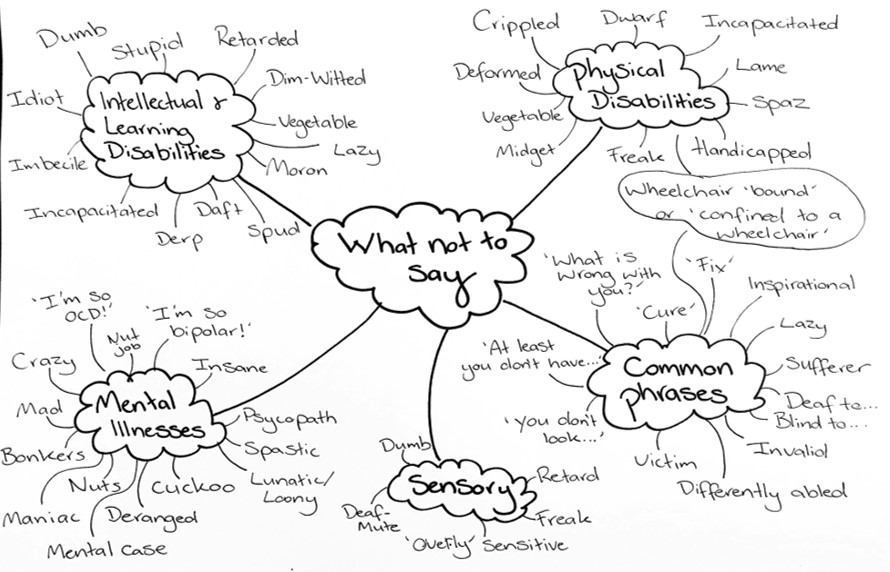
#OneSmallThing - Day 2 (Tuesday 28 November): Language
What you say, and how you say it, matters.
Language changes and it's our job to adapt and change with it.
TW: Ableist language and slurs. Please note that some of the below videos and images may be triggering or upsetting as they contains ableist words and slurs.
It's important to understand that not everyone communicates the same way, and that diverse communication should not stop connection!
Language can be a barrier and we as a community have a responsibility to remove these barriers to the best of our abilities by learning and adapting as language changes and develops. It's important to ask questions and, if you make a mistake, don't give up, take the opportunity to learn from that mistake.
The below video is important because it lets us know how we can better connect with people who have diverse communication needs. It also lets us know some things we shouldn't do, things that many people do without realising is offensive.
But, words are just words... right?
In this next video, you'll learn why language matters when speaking about disability. Hear from the disability community as they share their experiences and provide advice on how you can make people living with disability feel included.
TW: Ableist language and slurs. Please note that the below video may be triggering or upsetting as it contains ableist words and slurs.
Please don't let these videos scare you! Mistakes happen and provide an opportunity for growth and learning. After hearing from these two videos, you might be wondering what kind of words and phrases to avoid, and how to approach questions.
The below image has phrases that have been used in the past, but shouldn't be used any longer.
TW: Ableist language and slurs. Please note that the below image may be triggering or upsetting as it contains ableist words and slurs.

Important key takeaways:
- Disability is not a dirty word! Please avoid using euphemisms!
- Mobility aids are enablers, people are not "wheelchair bound"
- Don't pander to a non-disabled audience with statements like:
- "They overcame their disability"
- "They don't let their disability stop them"
People shouldn't have to go to extreme lengths to overcome barriers created by society and these statements can shame those living with disability who may be unable to do the same thing.
Remember to be respectful and polite with questioning:
-
Do you use identity first or people first language”/”do you have any language preferences”?
-
“What are your access needs?”
-
“What can I/we do to support you best?”
-
Is there anything I need to know or research so I/we can support you better?
When asking questions:
-
Be polite and respectful
-
Disability is only one aspect of a person’s identity
-
Some people prefer seeing questions ahead of time
-
Some questions or topics may be triggering
-
Create a safe space where people can decline
-
-
Content notes around things like ableism are important
Got #OneSmallThing you'd like to share on any of the topics above? We'd love to hear from you!
Simply send us an email at media@juliafarr.org.au or message us on socials with your #OneSmallThing - it can be a quick mobile video, something in writing, an audio file, a drawing, or any other medium that works for you!